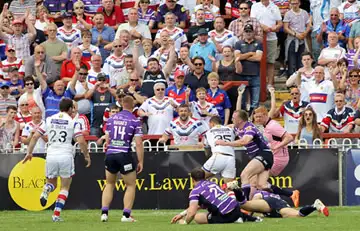Wakefield ‘s progress teaches valuable lessons

When the time comes to look back on the 2014 season, one of the more important moments may well prove to be the appointment of James Webster as Wakefield coach.
Since that time, Trinity have embarked on a superb run, and are now in contention for a play-off spot, something which looked utterly beyond them for most of the campaign.
The club are based in a town and region which lives and breathes rugby league, and should be consistently further up the table than they have been in recent years.
A sub-standard stadium and financial instability have not helped the cause, but the off-field structures now look to be taking shape. A new stadium is on the way, and the club can look forward to better days off the park.
The club have not gone through painful administrations, or launched highly publicised appeals for supporters’ own cash to save them.
Instead, they have used business nous and a thrifty, austere approach to right the ship, plug the leaks and start to look to the future. Hard work and endurance during a time of adversity has paid off in spades.
They also, tellingly, made sure that local creditors were paid in full when the club was debt-laden, and fulfilled their responsibilities to the wider community by avoiding administration.
Chairman Michael Carter and his commercial team should be applauded, as should those who paved the way for his work.
Webster’s appointment, in many ways, seems to have marked the final break with the past, providing the shift in momentum which many clubs need.
Wesbster is young, enthusiastic coach who has learned his trade, spending time as an assistant at Hull FC as well as the Wildcats. He has built on the roots laid down by Richard Agar, and looks ready to take his team up a level.
That is no slight on Agar. Sometimes a club just needs a freshening up; an evolution rather than a revolution, and Webster looks to have triggered that.
The weekend win over Warrington, where the Wildcats played with swagger and style, showed just how far they have come.
But one senses the real work will start next season. Webster’s honeymoon period will be well over by the start of 2015, and new league structures will have to be faced.
No one wants to end up playing in the middle section of the new post-split competition, and avoiding such a fate will surely be the club’s first priority.
But with an increasingly slick off-field operation complementing a fine attitude and hard work on the pitch, we could soon see Wakefield battling for honours once again.
They deserve to be. In a sport which often attempts to revive itself through gimmicks and innovations, Trinity have shown the virtues of doing things the right way, rather than acting out of expedience or arrogance.
There is a lesson there.